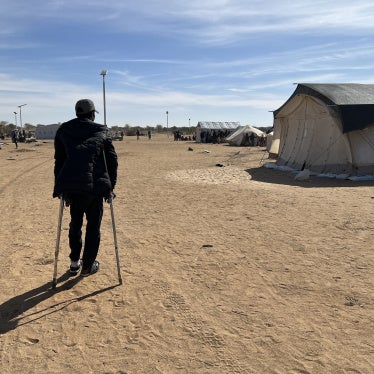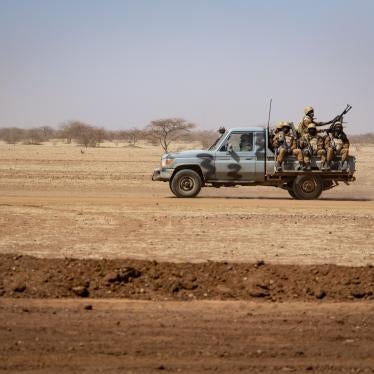Farida sat, subdued, on her metal bed in the safe house. The 17-year-old told her story calmly, in a quiet voice, carefully describing the rapes, running away, and her forced marriage to a drug addict. It was only when she spoke of her future that her face sank into despair, and her eyes filled with tears.
Afghanistan remains one of the worst places in the world to live as a woman. Since 2001, there have been some steps to recognize women's rights. But Human Rights Watch's research shows that many of these advances are reversing course.
Farida hoped to find a husband, a good man to take care of her. What she didn't say was how hard that would be in Afghanistan. Because of her past, she had lost her honor in the eyes of society. She no longer had a family to support her. She probably understood it would be nearly impossible to make her way in such a conservative society. In Afghanistan, a woman has little chance of making it on her own.
Even with familial support, women face daunting challenges here. Many of those working as teachers or midwives have received threatening letters or visits from armed men, forcing them to stop working. Tribal elders are pressured to keep girls out of school. Women in public life are threatened and several have been assassinated. But the government rarely, if ever, brings their abusers to justice.
Farida was 12 when her father divorced her mother and remarried. Her stepmother abused her, calling her names and starving her. She wanted Farida to marry her cousin, who Farida called a "bad man" - usually code for a drug addict or criminal. In Afghanistan, Farida was of marrying age.
Unable to tolerate the abuse, and likely aware that she had no say in the selection of her future husband, Farida ran away from home - this despite the fact that women need permission from a male to leave the home, even for an afternoon, unless it's an emergency. She hoped to find her mother in Kabul.
She sought comfort at the shrine of Hazrat Ali in Mazar-e-Sharif. There, a woman offered to help her find her mother and said Farida could come home with her. Farida soon learned that the woman's sister had a relationship with a "commander," and that the house was often visited by police or soldiers. One day, when everyone else went to the bazaar, they left Farida alone with a soldier. The soldier locked the door, then raped her.
Farida was held as a prisoner and repeatedly raped by many different men, some of whom may have been in the security forces. Farida remained captive for a year until another girl warned her that she would be killed, then helped her escape.
Farida, then 13, returned to her father and stepmother. Her rapists and virtual enslavers were never brought to justice - they weren't even investigated. Only recently did rape become a crime in Afghanistan. However, sex outside of marriage, or zina, was illegal. Sometimes, women who reported rapes to the police were convicted and jailed for zina. While this practice appears to be waning, it still exists.
After Farida returned home, her stepmother once again tried to force her to marry the cousin. Instead of accepting the marriage, Farida went to the police, who got her father involved. But her father disowned her.
"My father said I was not his daughter, and said ‘Do what you want with her,'" Farida said.
A local elder arranged a marriage between Farida and a drug addict. This time, Farida agreed, knowing she didn't have any choice. After all, what could a daughter disowned by her father expect?
Her new husband denied her food, water and clothes. She stayed with him for three years, before separating from him - an unusual step for an Afghan woman. It's extremely difficult for a woman to divorce a man in Afghanistan, but for once, Farida was lucky - her husband granted her a divorce.
Abandoned by her family and having no value in the eyes of society, Farida found her way to the safe house. She was 17 years old.
Farida knows that in Afghanistan, a land where women are treated as commodities, her countrymen view her as worthless. Yet she believes marriage is still her best hope for a stable future. She doesn't see any other options.
Many other Afghan women feel the same way.
With policymakers in Washington talking about reintegrating the Taliban into Afghanistan's government, many Afghan women fear that will only worsen the environment in which these kinds of abuses are permitted. Those leading the push for reintegration like to suggest that the insurgency is largely driven by economic or local grievances. But they should remember that extremism - and misogyny - are part of the Taliban's identity.
The Taliban can only be successfully reintegrated if Afghanistan has a credible government - otherwise the reconciliation risks fueling corruption and empowering local strongmen. Women should be included in this process to protect the few gains they have made in achieving their rights since the Taliban government fell in 2001.
But there is little hope that President Hamid Karzai will protect women's rights as the government and its supporters move toward reintegration. Just last month, he changed the electoral law by decree in a way that is likely to reduce the number of women in parliament.
While the Afghan leadership bears responsibility, the US administration will have more influence over how reintegration and reconciliation proceeds than Afghan women can. The United States can pressure the Afghan government to ensure that women's rights are upheld, that women can go to work, go to school, and take part in political life.
Farida knows her government should have supported her: "This isn't just a problem that I face - there are many girls who face these problems, I expected more help from the government. They should have done more for me, and for the other girls who have suffered like me."



